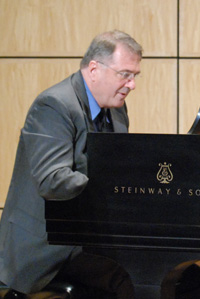"The technique Attilio Poto taught me is what I teach my students. It is essentially Italian opera conducting, and it is not hard; a person with some musical background can learn enough in six weeks to conduct an ensemble. It's just a matter of learning to use gravity so that the beat is predictable and doesn't look choppy. I tell my students, 'If you come to class, retain what I teach you, and practice 10 to 15 minutes a day, seven days a week, you will learn the technique.'"
"Once students learn a certain amount of technique in their second semester of the core course, they start learning how to conduct and rehearse a virtual orchestra with a computer program called Notion, which is amazing. I never had that luxury at that young age."
"But some people still like to learn using recordings, and I don't really agree with that. To do movements along with a recording is only learning to move. Conducting means leading; it doesn't make sense to teach conducting unless you're teaching people to follow the baton, to connect with the orchestra, and to rehearse them."
"Studying and going into details of scores is important for a conducting major. But in the required courses, what's most important in the limited time I have is to take students from zero to a point where they have a clear technique that will make the orchestra want to play for them."
"I also want my students to have a relatively good rehearsal technique: to know how to stop and start an orchestra, and when they hear something wrong, to fix it right away and not be muddling up there not knowing what to do. If they can do that, they're ready to do a lot of things."

